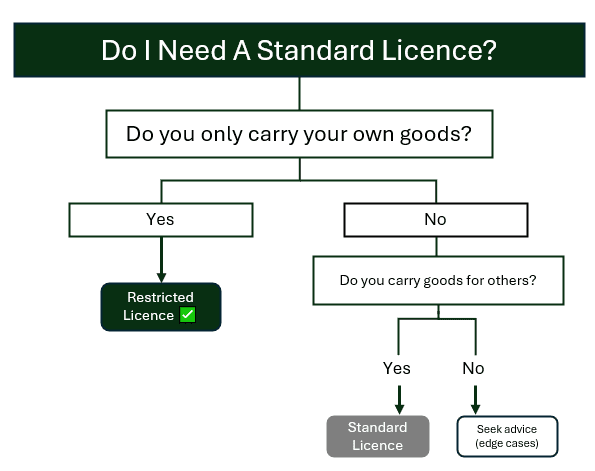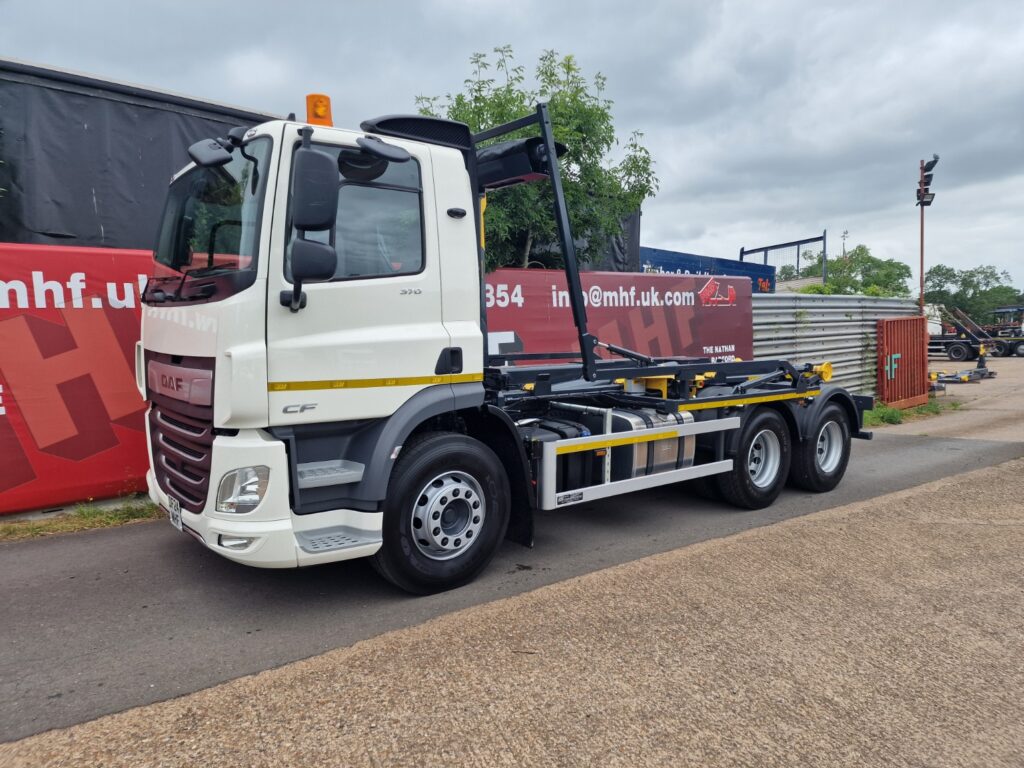With many types of licence available to businesses in the transportation industry there can be confusion about what licence type is the most relevant to a business. Here we focus on Restricted Operators Licences.
What is a Restricted Operator’s Licence?
A Restricted Operator’s Licence (ROL) lets businesses use HGVs to move their own goods only. It cannot be used to carry goods for other people or for hire/reward.
Moves its own rubble and machinery
Restricted licence sufficient
Transports skips full of waste belonging to customers
Needs a Standard licence
Moves soil, turf, and tools for its own projects
Restricted licence fine
Carrying other people’s goods
Standard licence required
Restricted Operators Licences (ROL) allows a licence holder to carry their own goods, but not the goods of other people within and between the UK and the European Union. They regulate and oversee the movement of goods in commercial vehicles.
In addition a ROL ensures that operators follow strict rules that govern the correct safety, maintenance and roadworthiness of operators’ vehicles whilst monitoring compliance with working hours regulations and meeting industry environmental standards.
The ROL was created to allow drivers to carry goods that they own and products that they have manufactured or equipment that they intend to hire and is relatively easy to apply for. It is crucial to remember that this type of licence does not allow a driver to carry goods for delivery that they do not own or for goods intended for hire or reward – this is strictly prohibited.
Tightly controlled by the Office for the Traffic Commissioner, Restricted Operators Licences are often applied for by businesses that do not have to have their own Certificate of Professional Competence (CPC) qualified transport manager. These are typically smaller businesses that are engaged in the transportation of goods such as scaffolding, construction, landscaping, and demolition firms.
An attraction of the ROL licence is that less cash resources are needed to prove financial stability in the application process. However, it should be remembered that a business must still keep up to date with all compliance and training despite the slightly relaxed ROL criteria and the application process involves intricate and meticulous attention to detail.

The application for a Restricted Operators Licence must be made either via the GOV.UK website or by post. The decision can take 7 weeks if the application is made online or up to 9 weeks if it is made by post. The web address is https://www.gov.uk/apply-vehicle-operator-licence.
There are a number of conditions that must be adhered to when applying for a Restricted Operators Licence. The applicant will need to:
Interim licences are available if a licence is required urgently until a full licence has been issued, however the Traffic Commissioner will only consider interim licence applications upon receipt of a complete application for an operator’s licence.
As mentioned before, ROLs are strictly controlled by the Office for the Traffic Commissioner. There are a number of conditions that must be adhered to in order to ensure that your licence is not revoked. A ROL will remain valid as long as you pay your continuation fee every 5 years and operate within the terms of the licence. Licence holders will be contacted every 5 years to ensure that the licence shows the correct information.

Trucks must be well maintained – it is a good idea to have a forward planner to schedule the preventative maintenance inspections (PMIs) required for each vehicle, MOTs and roller brake testing. This is to ensure that vehicles operate effectively and efficiently.
Drivers must keep to their driver hours, must be professionally trained, and must drive your vehicles legally and within the scope of their licence. Drivers’ eyesight must be tested regularly to ensure it is adequate.
As the ROL holder you must have an adequate system in place to carry out disciplinary procedures in case you are faced with any infringements.
If there are any changes to your business or if your drivers receive any convictions, you must inform the Traffic Commissioner.
Don’t forget that if you neglect to ensure these conditions are met you could be called to a Public Inquiry before the Traffic Commissioner where you risk losing your licence. It only takes a tired driver or an ill-maintained truck killing or injuring someone to send the licence holder to prison.
As with all licences it pays to be organised and to make sure that you know that you are complying with the terms set out when your licence was granted. It is much easier to manage a transport operation if systems are not only set up but are properly implemented.
Could you outsource your tachograph analysis? Many companies exist that will carefully analyse your drivers’ cards and vehicle unit information for you. You will receive accurate records covering driver hours and working time directive compliance and will have a lot less hassle in the office.
Even though the law does not require you to have a designated Transport Manager under the rules for a ROL, it is worth considering appointing one. This person wouldn’t be designated on the licence and wouldn’t need to be fully CPC trained but they would be required to have a working knowledge of rules and regulations to ensure that they can competently oversee your operations.
As mentioned before, you should keep your forward planner up to date. Make sure that your vehicles are sent to their PMIs, MOTs etc and keep a close eye on the defect inspections that your drivers should complete on a daily basis. Faults and any necessary rectifications must be recorded properly. As the licence holder you are responsible for ensuring that the licence obligations are met – good records could save your licence.
A Restricted Operator’s Licence (ROL) lets a business use HGVs to carry its own goods in the course of its trade. It cannot be used to carry goods for other people or for hire or reward.
No. Skip hire involves transporting waste owned by customers, which is classed as hire or reward. A Standard Operator’s Licence is required.
A CPC-qualified transport manager is not required for a Restricted Licence. However, operators must still ensure effective systems for maintenance, drivers’ hours and compliance, and may choose to appoint someone competent to oversee operations.
Allow around 7–9 weeks from a complete application, including the statutory advertisement period and Traffic Commissioner checks. Online applications are typically faster than by post.
Restricted licences cover goods vehicles over 3.5 tonnes gross vehicle weight (GVW) used to carry your own goods. They do not permit carrying goods for others for payment.
A Restricted Licence allows carriage of your own goods only. A Standard Licence permits carriage for hire or reward and requires additional undertakings such as financial standing and a CPC-qualified transport manager.
Yes. You can apply to vary your licence to a Standard (National or International) if you meet the requirements, including financial standing and having a CPC-qualified transport manager in place.
Using the wrong licence can lead to enforcement action, a Public Inquiry, fines, curtailment or revocation of the licence, and reputational and contractual consequences. Compliance is the operator’s responsibility.
Costs include the application fee, licence issue fee and five-year continuation fees, plus ongoing compliance and maintenance costs. Check GOV.UK for current statutory fees and guidance.